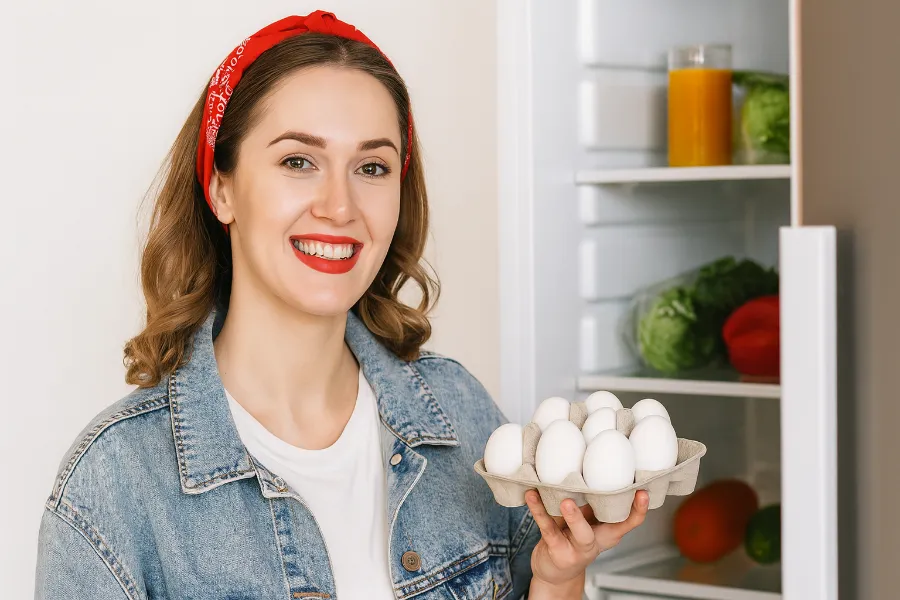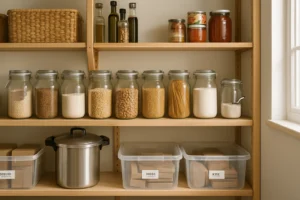Okay when I say “refrigerator eggs,” I mean eggs kept under ideal, consistent cold conditions. I talk about this early because once you commit to the fridge, everything else (freshness, safety, shelf life) hinges on doing it right. This article is all about storing eggs in the fridge not room temperature, not ambient how I do it, and how you can too, with confidence.
After years of cooking, baking, and sometimes learning from mistakes, I’ve become pretty picky about how I store eggs. They may seem simple, but they demand respect. The way you shove a carton in the door or leave out cracked shells can make or break your week’s breakfasts (let alone baked goods). So here’s how I treat refrigerator eggs like precious cargo — and how you can, too.
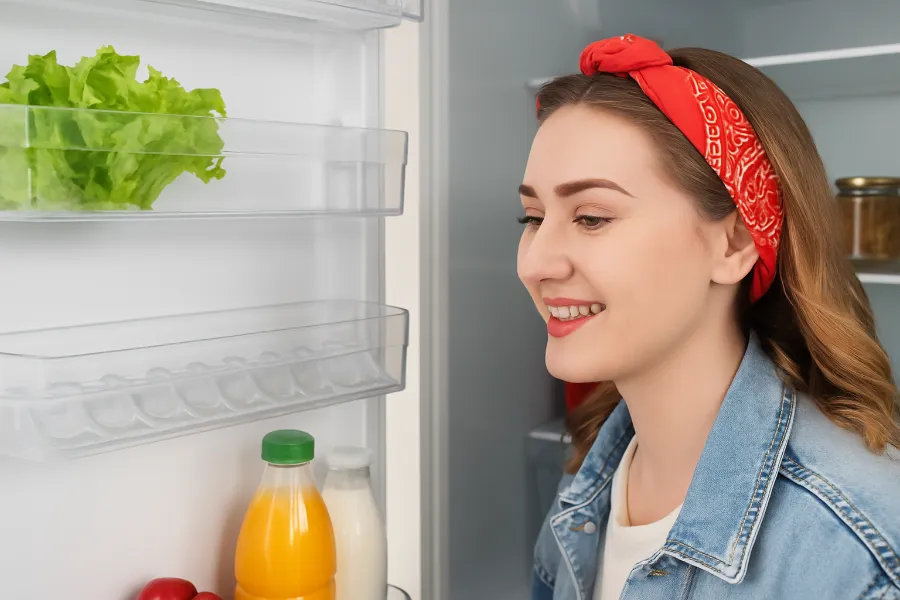
Fridge Eggs: Where They Live in My Fridge
If you peek inside my fridge, you won’t find any eggs in the door slot. (Yes, even if the fridge came with one built in!) Over time, I learned that those door compartments are tempting but terrible for egg storage.
Here’s how I do it:
- Never in the door: Every time the fridge door opens, that little egg rack sees warmer air, temperature swings, and frosting risk. It’s the most unstable spot.
- Always in original carton: I leave eggs in the carton they came in. That carton was designed to protect the shells, buffer minor bumps, and keep track of “best by” dates.
- Back, middle shelf: I tuck the carton toward the back of the middle shelf (or lower, if that’s the coldest zone). That area stays the coldest and most consistent.
- Pointy side down: Yes, I rotate the eggs so the narrower end points down. It helps keep the air cell stable and reduces yolk shifting.
Doing this keeps refrigerator eggs in a steady cold environment — not just “cold,” but consistent cold.
Egg Shelf Life: How Long My Eggs Last in the Fridge
One of the biggest anxieties people have: How long can I actually keep eggs in there before they go “bad” or taste off? The answer depends, but I’ve learned these practical guidelines through trial, reading, and food safety advice.
Here’s what works in my kitchen, and what experts back:
- Raw, in the shell: 3–5 weeks past purchase, if stored cold and stable. (Some sources show similar ranges.
- Raw whites / raw yolks (separated): 2–4 days in airtight containers. Whites tend to last a bit longer than yolks.
- Hard-boiled eggs (in shell): Up to 7 days, stored cold.
- Hard-boiled and peeled: 1–2 days, in a sealed container, to avoid drying or absorbing odors.
I always write the “date in fridge” on a piece of masking tape or use a marker on the carton. Helps me eyeball which eggs to use first.
Keep Eggs Fresh: My Cold Storage Rituals
It’s not just where you put eggs, but how you treat them that helps keep eggs fresh. Here are habits I swear by, and that food safety guidelines support:
- Maintain fridge at ≤ 40°F (4°C)
I use a fridge thermometer. If temps creep above 40°F, bacteria like Salmonella can work faster. The FDA also recommends storing eggs at 40°F or below. - Don’t wash commercial eggs at home
Eggs at the store are already washed and sanitized, so they don’t need a second wash. Washing at home can remove protective coating and let bacteria in. - Avoid exposing to strong odors
Eggs are porous — they can absorb odors from strong-smelling foods (onions, garlic, strong cheeses). The carton helps shield them. - Handle gently & avoid cracked shells
A fine crack is like a highway for air and bacteria. I discard eggs with cracks (or cook immediately). - No back and forth
Once eggs go in the fridge, I don’t take all of them out to warm up and then return them. Condensation forms, which leads to bacterial paths. I only remove what I plan to use.
These small steps make a big difference in preserving quality.
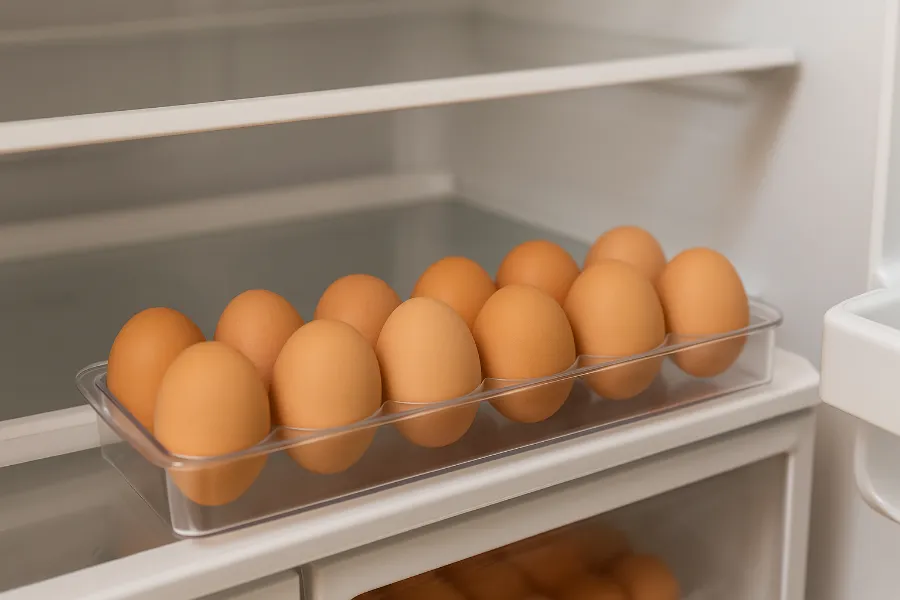
Egg Expiration: How I Decide When to Toss
Dates printed on cartons are guidelines and mostly about quality, not safety. Still, I use them — but trust my senses more. Here’s how I judge egg expiration in my own fridge:
- Sniff test: A bad egg smells unmistakably sulfurous.
- Float test: Fill a bowl with cold water. Fresh eggs sink and lay flat on their sides. Eggs that tilt upward or float? They’re older.
- Crack check: I crack questionable eggs into a separate bowl first. If the white is watery or unusual color, I discard.
- Date logic: If it’s well past 5 weeks, even if it looks okay, I err on safety.
When I’m baking, I’ll use older but still safe eggs. For poaching or delicate prep, I choose only the freshest.
Cold Storage: Why It Makes All the Difference
Now, a bit of the “why” behind cold storage — so you know this isn’t just fussiness.
- Bacterial growth slows: Pathogens can’t multiply as easily in cold conditions.
- Quality preservation: At the right cold temp, proteins in the white and yolk break down more slowly.
- Scientific backing: A USDA/ARS study showed that eggs stored in the refrigerator (whether washed or unwashed) stayed at Grade A quality far longer than eggs at room temperature.
- Weight & moisture retention: Refrigeration helps eggs retain moisture and avoid weight loss that accelerates spoilage.
That’s why cold storage (not just cooling) is the bedrock of how I treat eggs.
Common Mistakes (From My Learning Curve)
I’ve made more than a few missteps storing eggs. Here are pitfalls I see others make and how to avoid them:
- Using the door tray
- Taking eggs out too early
- Washing store-bought eggs
- Placing eggs near strong-smelling foods
- Forgetting to track dates
- Mixing cracked and intact eggs
Once I cleaned up those habits, I noticed my eggs stayed good longer, cracked less, and I wasted fewer.
Recipes & Uses: When to Use Which Eggs
Knowing your egg’s age helps with recipe choice. Here’s how I match egg freshness to cooking:
- Very fresh: Poaching, frying sunny-side up, custards.
- Middle-aged: Baking, mixing, scrambled eggs.
- Older but still good: Hard-boiling, egg salads.
For example, I’ll save the freshest eggs for soufflé or delicate custards. Older ones I reserve for baking or egg salad, where structure is less critical.
Safety with Refrigerator Eggs
Storing eggs cold is just one half of the equation safe handling completes it. Here’s what I always do:
- Wash hands and surfaces after touching raw eggs
- Cook eggs until whites and yolks are firm (or use pasteurized eggs for soft preparations)
- Refrigerate cooked egg dishes within two hours
- Discard leftovers with eggs within 3–4 days
- Never leave eggs (cooked or raw) at room temp too long
These are rules I live by, especially in warmer months.
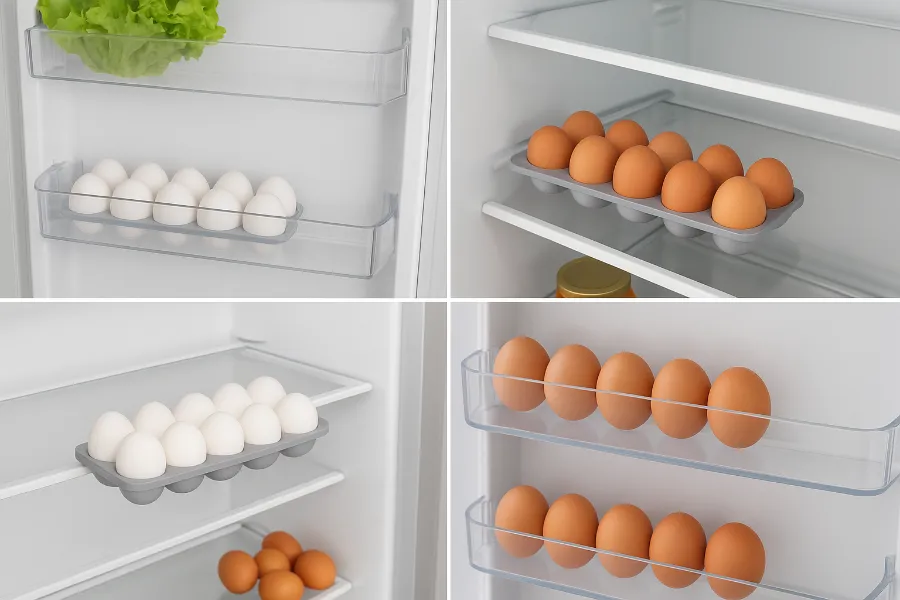
My Final Thoughts on Refrigerator Eggs
Storing eggs in the fridge, done well, means fewer bad omelets, safer meals, and more confidence in your cooking. When you treat refrigerator eggs with respect — original carton, coldest shelf, zero back-and-forth, and smart testing — you take what could be a random gamble and turn it into a reliable process.
If you’d like, I can help you compare your kitchen’s egg storage to guides like Martha Stewart’s or USDA’s, and even audit your fridge plan. Want me to do that?
FAQs
Refrigerator eggs can last 3–5 weeks past the purchase date if kept in their original carton. Always check freshness with the float test or smell before using.
No, the fridge door has the most temperature swings. Eggs stay fresher longer when stored on the middle or bottom shelf.
It’s not recommended. Washing removes the protective coating that helps keep eggs fresh and safe.
Store them pointy side down, keep them in the original carton, and place them away from strong-smelling foods. Maintain a steady fridge temperature at 40°F or lower.
Check the date on the carton, do the float test, and trust your senses. If they smell bad or look off, discard them.
No, hard-boiled eggs last about 7 days in the fridge. Peeled hard-boiled eggs last only 1–2 days in a sealed container.
No, cracked eggs are more vulnerable to bacteria. Use them immediately in cooking instead of storing.

